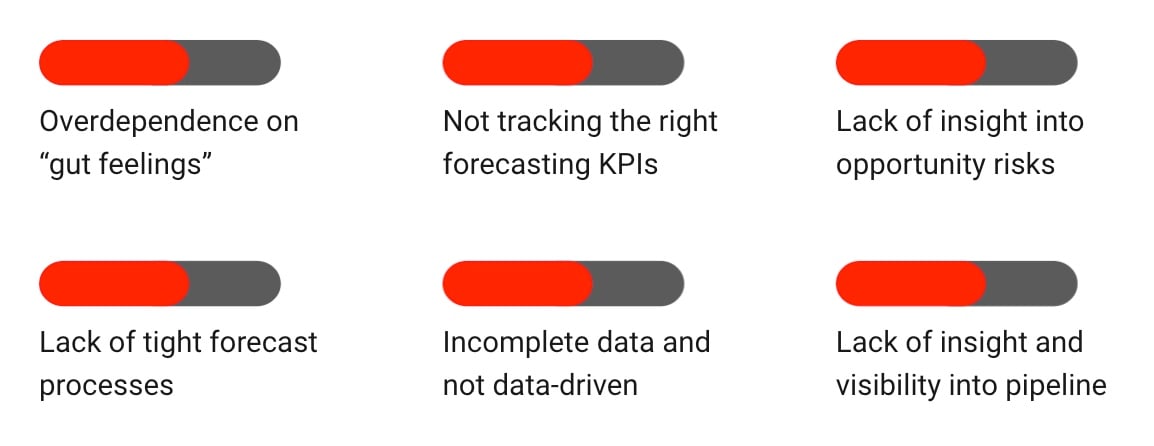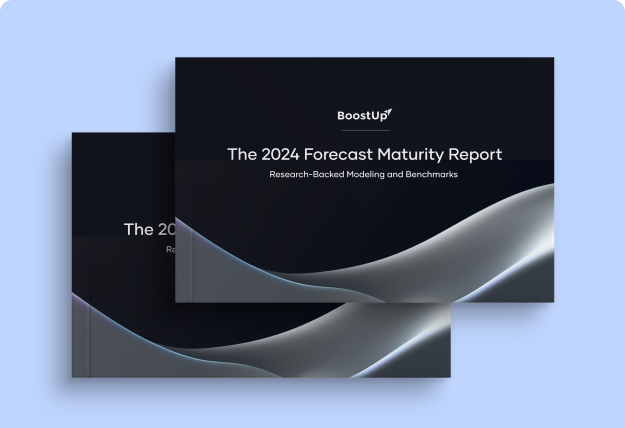The Revenue Blog /
5 Tips for Running a Successful Forecast Review Meeting
5 Tips for Running a Successful Forecast Review Meeting

Topics covered in this article
The Purpose
As a sales and operations leader, keeping up with your team’s forecasts, opportunities at risk, and overall pipeline health is necessary to ensure that your sales engine runs at optimal capacity. Forecast accuracy is likely the most critical aspect of a sales organization, and effective sales leaders want to leave nothing to chance.
Missing your forecast has numerous negative implications, including missed revenue, decreased funding, decreased company value, lost plan dependency, layoffs, lowered board confidence - just to name a few.
Why Companies Miss Their Forecast
There could be a lot of reasons why companies miss their forecast, but from our research in speaking with thousands of revenue leaders, it comes down to:
- Overdependence on “gut feelings”
- Not tracking the right forecasting KPIs/metrics
- Lack of insights into opportunity risks
- Lack of tight forecast processes
- Incomplete data and not data-driven
- Lack of insight and visibility into pipeline health

Tips for a Successful Forecast Review
When conducting a forecast review meeting, you must plan for success. Here are five tips for running a successful forecast review meeting.
- Determine Who Should Attend
- Prepare Ahead of the Call
- Conduct a Thorough Inspection
- Realign and Plan Next Steps
- Identify the Right Frequency/Cadence
Tip 1: Determine Who Should Attend
The easy answer is it depends on the size of your organization, but in reality, it should, at a minimum, include your sales manager, sales reps, and sales/revenue operations. But for more effective forecast review meetings, I would recommend including solution engineering and RevOps representatives, who can bring data-driven insights. BoostUp's 2025 Compensation Report shows that, currently, nearly half of revenue teams are not included in regular strategic review meetings -- leading to misaligned strategies and missed opportunities for optimizing revenue outcomes.
The more stakeholders that adhere involved in the forecast meeting, the greater likelihood of a successful meeting. This stakeholder group should get together to discuss the individual meetings that make up the forecast so the most accurate forecast can be delivered to management. Forecast meetings also provide a great opportunity to provide coaching opportunities.
Tip 2: Prepare Ahead of the Call
For forecast review meetings to be successful, both the sales manager and the sales reps must come prepared. They should know each deal, inside and out, and be prepared to speak to why the deal is expected to close and what possible factors could cause the deal to push or slip to the next quarter.
Sales managers should also be prepared to ask difficult questions about each opportunity and the sales reps must be prepared to answer them.
Tip 3: Conduct a Thorough Inspection
During the deal inspection, you must be prepared to ask and answer the toughest of questions. This instills confidence that the deal will close as expected. A thorough inspection of each deal forecasted to close will result in a more confident and accurate forecast. Questions to ask should include:
- Who signs off on the deal?
- When did you last speak to the decision-maker?
- Who is the champion? Who is the detractor?
- Do we have the technical win?
- Do we have the business win?
- What is the event that is causing them to sign this quarter
- What was the last step you completed? What is your next step of action?
Tip 4: Realign and Plan Next Steps
During the course of effective forecast review meetings, forecasted deals will be in question, deals will be pushed to the next quarter, next steps will be identified, and action items will be assigned. These are signs of a successful forecast review meeting.
Once you have identified the action items and next steps, you must document each next step with a completion date. This will ensure that the proper steps are taken to ensure an accurate forecast, and it will also weed out the deals that should be pushed to the next quarter.
Tip 5: Identify the Right Frequency/Cadence
The forecast review meeting, in most instances, should be held weekly to ensure that the forecasted deals are moving forward and that they are still expected to close in the quarter. This close review also ensures that you understand the business and this will lead to even more impactful review meetings in the future. It will also help the business better understand average ACV, sales cycle length and ultimately improve win rates and forecast accuracy.
How BoostUp Can Help
BoostUp provides your revenue team with real-time access to every touchpoint and between the buyer and seller team. This allows you to verify the seller’s judgment on a forecasted deal instantly.
BoostUp provides complete visibility into all sales activity, with smart deal forensics delivering deal-winning insights to your front-line teams. In addition, our platform analyzes prospect sentiment using NLP, instantly flagging at-risk deals, providing full risk context, and suggesting strategic next steps.
With BoostUp, you can create your custom forecast in as little as 24 hours. We empower your revenue team with forecasting designed for repeatable, predictive growth. Powered by AI, BoostUp’s forecasting intelligence solution delivers actionable insights your front-line teams need to hit the coveted 95% forecast accuracy and close more deals, faster.
In part two of this blog, we will cover “How to Run a Forecast Review in BoostUp.”
FAQ - Forecast Review Meeting
What is the Purpose of a Forecast Review Meeting?
A forecast review meeting aims to ensure the accuracy of sales forecasts by reviewing team forecasts, identifying at-risk opportunities, and assessing pipeline health. Accurate forecasts help in strategic planning and maintaining operational efficiency.
Who Should Attend a Sales Forecast Review Meeting?
The essential attendees are:
- Sales Manager: Provides oversight and strategic direction.
- Sales Representatives: Offer detailed insights into individual deals.
- Sales Operations / RevOps: Ensure data accuracy and process consistency.
- Solution Engineering and Consulting: Contribute technical and customer solution perspectives.
Involving a diverse group of stakeholders enhances the accuracy of the sales forecast and provides opportunities for cross-functional coaching and collaboration.
How Can Forecast Reviews Improve Sales Forecast Accuracy?
Forecast review meetings improve sales forecast accuracy by:
- Enhancing Data Quality: Regular reviews ensure data is up-to-date and accurate, which is essential for precise sales forecasting.
- Identifying Risks: Reviews help identify at-risk deals early, allowing for timely interventions to mitigate potential losses. BoostUp's 2025 Compensation Report shows that companies that proactively address deal risks see more than double the revenue attainment.
- Increasing Accountability: Frequent check-ins hold sales reps accountable for their forecasts, encouraging more accurate and realistic projections.
- Facilitating Continuous Improvement: Regular feedback and adjustments during reviews lead to refined forecasting processes over time.
How Frequently Should Sales Forecast Review Meetings be Held?
Forecast review meetings should generally be held weekly. This frequency helps ensure that forecasted deals are on track, provides regular updates on sales pipeline health, and aids in understanding business metrics like ACV and sales cycle length.
What Are Some Key Questions to Ask During a Deal Inspection?
During a deal inspection, asking the right questions is crucial to improving sales forecast accuracy. Key questions include:
- Who signs off on the deal: Identifies the decision-maker.
- When did you last speak to the decision-maker: Ensures recent and relevant contact.
- Who is the champion and who is the detractor: Assesses internal support and opposition.
- Do we have the technical and business win: Confirms alignment with both technical needs and business goals.
- What event is causing them to sign this quarter: Understands the urgency and timing.
- What was the last step of action: Ensures accountability for executing sales strategy.
- What is the next step of action: Defines clear, actionable next steps.
How Can BoostUp Enhance Sales Forecast Review Meetings?
BoostUp enhances forecast review meetings by providing real-time access to all sales activities and interactions between the buyer and seller teams. It uses advanced analytics and natural language processing (NLP) to deliver insights into deal health and identify at-risk opportunities. BoostUp’s platform offers smart deal forensics, which aids in verifying sales judgments and suggests strategic next steps, ensuring a high level of forecast accuracy and efficiency.



-Photoroom.png)